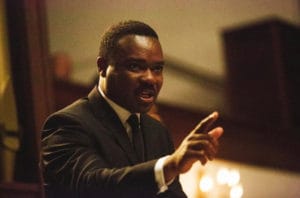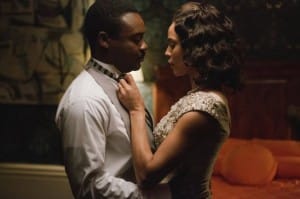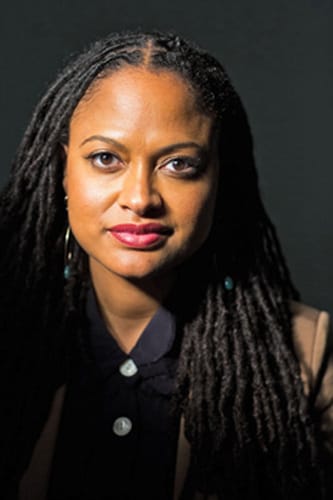Review by Salim Muwakkil

I’ve finally seen “Selma” and can report it is a proper civil rights movie. By that I mean it takes few chances either thematically or aesthetically. The icons remain intact and the movement free from revisionist recriminations. This cautious (non-controversial) strategy is understandable in a risk-averse Hollywood where box office margins are being rigorously calibrated and boycott possibilities loom. Although boxed in by those kinds of commercial expectations, “Selma” delivers even more than it should.
That unexpected bounty is due to first-time screenwriter Paul Webb’s decision to give some focus on the disagreements that beset the movement and the doubts of a humanized Dr. Martin Luther King. He and director Ava DuVernay’s decision to maintain those underlying tensions throughout the film prevents it from succumbing to hagiographic temptations that must have been powerful given the hallowed subject and the revered characters.

Interestingly, both King (David Oyelowo) and his wife Coretta (Carmen Ejogo) are played by Afro-Brits. Director DuVernay reportedly played a large role in casting and perhaps she’s a devotee of this notion of diasporic resonance: the belief that African-American characters gain more texture when refracted through the sensibilities of black Brits. The success of Chiwetel Ejiofor and Lupita Nyong’o in “12 Years a Slave” increased the currency of that belief as well as the outsized success of Idris Elba.
The film’s intent to give a sense of the movement that forced President Lyndon B. Johnson to push the Voting Rights Bill is fulfilled. It focuses not just on the racist opposition that creates the need for such a movement but also on the deal making that helped it succeed and the ideological tensions that occasionally deterred it. The tensions between the youth-based Student Non-Violent Coordinating Committee (SNCC) and King’s Southern Christian Leadership Conference (SCLC) were given more shrift than usual, but still were significantly underplayed.
The film’s intent to give a sense of the movement that forced President Lyndon B. Johnson to push the Voting Rights Bill is fulfilled. It focuses not just on the racist opposition that creates the need for such a movement but also on the deal making that helped it succeed and the ideological tensions that occasionally deterred it.
DuVernay cleverly reveals the extent of FBI surveillance by superimposing official data entries as captions over certain portrayed incidents. This gesture may once have seemed radical but it has become a mainstream commonplace that J. Edgar Hoover (played by Dylan Baker) despised King and aggressively pursued him, specifically targeting his marriage and domestic relations.

The DuVernay and Webb film is also the first mainstream fare to tackle the subject of King’s infidelities, albeit very gently. The quiet dignity of Ejogo’s Coretta King, a steady, stunning presence throughout, deeply shames her husband for his indiscretions. Her fears about the “fog of death” that surrounds King’s movement are made clear early in the film and are deeply registered in her burdened but determined bearing. When her jailed husband has a spasm of jealousy about a meeting she had with Malcolm X, she deftly defuses it with an adorable mixture of deference and defiance.
There are good performances all around. Oprah, who also co-produced, plays a Southern matron, a role for which she is becoming typecast. Tim Roth plays a hell of a George Wallace. And Wendell Pierce has Hosea Williams down. There are smaller roles well played by folks like Cuba Gooding Jr., Martin Sheen, Common, Tessa Thompson and Keith Stanfield. Brad Pitt’s Plan B, which also helped produce “12 Years a Slave,” was also a producer.
There was some controversy regarding the portrayal of LBJ as a reluctant supporter of Voting Rights and an opponent of the Selma March. But just as DuVernay sought to humanize King, she had similar aspirations for the LBJ character, and many historical accounts support her portrayal.
Salim Muwakkil is a senior editor of In These Times, host of The Salim Muwakkil Show on WVON, Chicago’s historic Black radio station, and a columnist for the Chicago Tribune. His journalism career began as a reporter for the Associated Press and he later became managing editor at Muhammad Speaks-Bilalian News, the largest Black-owned publication in the country. He can be reached at salim4x@aol.com or on Facebook, where this story first appeared.
Malcolm X in Selma
Doing some research on the actual Selma March for a piece I’m writing about the movie, I just learned something that I did not know. There is a scene in the movie where Malcolm X is invited down to Selma months before the march to give a speech.
In real life he was invited down by the more radical youth organization SNCC, which was started by Ella Baker and led by both John Lewis and then Stokely Carmichael. The traditional, more conservative SCLC leadership, including Martin Luther King Jr., according to the movie, was worried about Malcolm X’s presence and what he would say.
The film doesn’t inform you of this, but the speech Malcolm X gave to Black folk in Selma, Alabama, in his first and only trip to the Deep South on Feb. 4, 1965, was perhaps one of his most famous: “The House Negro and the Field Negro” speech. In this same speech, he announces the ability of Black citizens to take the United States to the United Nations and charge them with violation of their human rights.
The film doesn’t inform you of this, but the speech Malcolm X gave to Black folk in Selma, Alabama, in his first and only trip to the Deep South on Feb. 4, 1965, was perhaps one of his most famous: “The House Negro and the Field Negro” speech.
Malcolm X was assassinated a little more than two weeks later, on Feb. 21, 1965 – very profound and revealing regarding the actual context of events rendered in the movie: Was Malcolm X’s death related to the possibility of him merging with the traditional Civil Rights Movement, among other things.
This assumes you agree there’s more to his death than the Nation of Islam infighting narrative. In his autobiography, “Ready for Revolution,” Stokely Carmichael/Kwame Ture says Malcolm met with Fannie Lou Hamer and other SNCC activists in Harlem earlier and they all loved him. He suggests that union was the direction things were going in because of Malcolm X’s admiration for SNCC.
Pascal Robert (pronounced Ro-Bear like Stephan Colbert) is a writer best known as the Thought Merchant, as an advocate for the Haitian people on Dessaline’s Children and as co-founder of the Haitian Bloggers’ Caucus. His work often appears on the Huffington Post. Follow him on Twitter at @probert06 and on Facebook, where this commentary first appeared.
http://youtu.be/HgTweIijMQk





